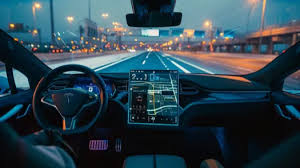Navigating The Road Ahead: Recent Trends and Developments in Automotive AI

Strong 8k brings an ultra-HD IPTV experience to your living room and your pocket.
Introduction:
The automotive industry is undergoing a profound transformation as Artificial Intelligence (AI) continues to reshape the way we drive, manufacture vehicles, and design transportation systems. From enhancing vehicle safety and performance to creating smarter cities, AI is becoming an indispensable tool that drives both innovation and efficiency. As we look to the future, AI is expected to play an even more significant role in revolutionizing how transportation systems function. By 2030, AI will be central in not only how vehicles operate but also how they interact with the infrastructure around them.
Download FREE Sample of Artificial Intelligence Market: https://www.nextmsc.com/artificial-intelligence-market/request-sample
In this article, we will explore the recent trends and developments in automotive AI, highlighting the role of autonomous vehicles, electric vehicles, AI-powered traffic management systems, and the technology’s impact on both drivers and cities. Specifically, we will delve into AI-based traffic management systems and their role in making cities smarter and safer.
The Rise of Autonomous Electric Vehicles (EVs)
One of the most transformative trends in automotive AI is the rise of autonomous electric vehicles (EVs). As electric vehicles continue to gain popularity due to their environmental benefits and lower operational costs, AI is helping to accelerate the development of self-driving EVs.
Autonomous vehicles rely heavily on AI to process data from an array of sensors, including cameras, radar, and LiDAR. These sensors enable the vehicle to perceive its environment and make decisions in real time. AI algorithms use machine learning to improve these decision-making processes, allowing the vehicle to navigate complex driving scenarios without human intervention.
For EVs, AI is crucial for optimizing energy consumption and extending battery life. AI algorithms learn from driving habits and environmental factors to optimize battery charging and discharging, improving the vehicle's overall range. Furthermore, AI can predict when maintenance is required, providing predictive analytics to avoid costly breakdowns.
By 2030, autonomous EVs are expected to become mainstream, with more vehicles on the road offering self-driving capabilities. The integration of AI in EVs will not only make them smarter but will also increase their adoption, as drivers will benefit from improved safety, convenience, and sustainability.
AI-Based Traffic Management Systems: Making Cities Smarter and Safer
As cities around the world grow in population and vehicle numbers increase, managing traffic efficiently and safely becomes a growing challenge. AI-powered traffic management systems are emerging as one of the key solutions to this problem. These systems use AI to monitor, analyze, and optimize traffic flow in real-time, reducing congestion, preventing accidents, and improving the overall efficiency of transportation networks.
AI-based traffic management systems rely on vast amounts of data collected from various sources, such as traffic cameras, road sensors, GPS devices, and social media feeds. By analyzing this data, AI can predict traffic patterns, detect accidents, and identify congestion hotspots. The system then adjusts traffic signal timings, reroutes vehicles, and even sends real-time updates to drivers through navigation apps.
The benefits of AI-powered traffic management are clear. These systems not only reduce congestion but also improve road safety by providing early warnings of potential hazards. In the event of an accident or emergency, the AI system can automatically adjust traffic signals to create clear paths for emergency vehicles, speeding up response times and potentially saving lives.
Additionally, AI traffic management systems can be integrated with autonomous vehicles, creating a more seamless and efficient transportation environment. Self-driving cars can communicate with traffic management systems to optimize routes, avoid congestion, and follow traffic regulations. The development of AI-based traffic management systems will help cities become smarter and safer, providing more efficient transportation options for residents and visitors alike.
The Growing Role of Advanced Driver Assistance Systems (ADAS)
Advanced Driver Assistance Systems (ADAS) are another area where AI is having a significant impact. ADAS technologies use AI to enhance vehicle safety by providing real-time alerts and interventions to help prevent accidents. Features such as lane departure warnings, adaptive cruise control, automatic emergency braking, and parking assistance are powered by AI and are already available in many modern vehicles.
ADAS relies on sensors and cameras to collect data about the vehicle’s surroundings. AI processes this data to make decisions, such as whether a vehicle is too close to an obstacle or if the driver is drifting out of their lane. AI can then alert the driver or take corrective actions, such as steering the vehicle back into the lane or automatically applying the brakes to avoid a collision.
In the coming years, we can expect ADAS technologies to become even more advanced, with AI enabling more sophisticated features like driver monitoring systems that detect fatigue or distraction, as well as enhanced collision avoidance systems. By 2030, these systems will be a standard feature in most new vehicles, making driving safer for everyone on the road.
AI in Electric Vehicle (EV) Battery Management
Battery management is one of the most critical aspects of electric vehicle performance, and AI is helping to optimize this process. AI-powered systems can monitor the health of EV batteries, predicting when maintenance or replacements are needed, and ensuring that the vehicle is operating at peak efficiency.
AI algorithms analyze data from various sensors embedded in the battery to monitor factors such as temperature, voltage, and charge cycles. By detecting early signs of battery degradation or inefficiency, AI can recommend adjustments to improve the battery's performance and longevity.
Moreover, AI plays a crucial role in optimizing charging strategies for EVs. By analyzing factors such as the driver’s usage patterns and the availability of charging stations, AI can help to determine the optimal time and location for charging. This not only improves battery life but also helps drivers maximize the efficiency of their EVs.
As the adoption of Electric Vehicles (EVs) continues to rise, the integration of AI into EV battery management systems will be essential in ensuring that these vehicles remain sustainable, efficient, and cost-effective.
Download FREE Sample of Electric Vehicle Market: https://www.nextmsc.com/electric-vehicle-market/request-sample
AI-Powered Vehicle Manufacturing and Supply Chain Optimization
The integration of AI into vehicle manufacturing and supply chain processes is another area where the automotive industry is seeing significant changes. AI technologies, such as machine learning, robotics, and predictive analytics, are improving manufacturing efficiency, reducing costs, and ensuring higher product quality.
AI-driven robots are now being used in vehicle assembly lines to perform tasks with greater precision and efficiency than human workers. These robots can work around the clock, ensuring that production schedules are met and that vehicles are manufactured to the highest quality standards. Additionally, AI is being used to optimize the supply chain by predicting demand for specific components, identifying potential bottlenecks, and ensuring that parts are delivered on time.
The result is a more streamlined production process that can quickly adapt to changing market conditions. As the automotive industry continues to embrace AI, we can expect further advancements in manufacturing processes that will lead to reduced production times, cost savings, and improved vehicle quality.
AI and the Future of Mobility: Enhancing User Experience
The way we interact with vehicles is also being transformed by AI. In-car AI systems are providing increasingly sophisticated user experiences, from intelligent infotainment systems to voice-activated controls. These systems not only improve the convenience of driving but also enhance safety by allowing drivers to control vehicle functions without taking their eyes off the road or their hands off the wheel.
Voice recognition technology, powered by AI, is becoming more advanced, allowing drivers to interact with their vehicles in natural language. Drivers can now control music, navigation, and climate settings using voice commands, creating a more intuitive and hands-free driving experience.
As AI technologies continue to evolve, we can expect even more advanced features to be integrated into vehicles. These might include personalized driver profiles, where the car automatically adjusts settings based on the driver’s preferences, or intelligent navigation systems that predict traffic patterns and offer the fastest routes based on real-time data.
The Role of AI in Vehicle Safety and Security
Vehicle safety is paramount, and AI is playing a critical role in enhancing vehicle security. AI technologies are used to monitor the driver’s behavior, detect signs of fatigue or distraction, and alert the driver if they need to pay attention. In some cases, AI can even take control of the vehicle to avoid accidents.
In addition, AI is being used to enhance vehicle security by enabling advanced authentication systems, such as facial recognition and biometric sensors, to prevent unauthorized access to the vehicle. This will make vehicles more secure from theft and unauthorized use in the future.
The Future of Automotive AI
The automotive industry is poised to undergo a radical transformation thanks to the continuous advancements in AI technologies. From autonomous vehicles to AI-powered traffic management systems, AI is enabling more efficient, safer, and smarter transportation options. As the demand for electric vehicles, autonomous driving, and smart cities grows, AI will continue to play a crucial role in shaping the future of mobility.
By 2030, AI is expected to be deeply embedded in every aspect of the automotive sector, from vehicle design and manufacturing to traffic management and city planning. The integration of AI into transportation networks will not only improve the driving experience but also contribute to the creation of smarter, more sustainable cities.
Conclusion
The development of AI-based technologies in the automotive industry is not just about creating smarter vehicles but also about improving the overall transportation ecosystem. The rise of autonomous EVs, the integration of AI-powered traffic management systems, and the evolution of in-vehicle safety and manufacturing processes are all driving the growth of the automotive AI market. With the continued advancement of AI, the future of transportation looks brighter, smarter, and safer than ever before.
Read the complete blog: https://www.nextmsc.com/blogs/automotive-ai-market-trends
Note: IndiBlogHub features both user-submitted and editorial content. We do not verify third-party contributions. Read our Disclaimer and Privacy Policyfor details.


